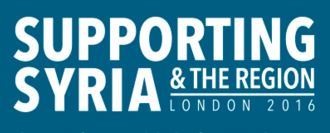Syria Donors Conference: A ‘Vision of Hope’ for the Next School Year? By Hiba Salem
By Hiba Salem, University of Cambridge.

“Never has the global community raised so much money in a day”, states Secretary-General Ban Ki-moon, referring to the $10bn pledgeduring the Syria Donors Conference, which took place in London a week ago today on the 4th of February, 2016. The one-day conference I previously discussed invited world leaders to gather and respond to the urgent call for funds to provide better education, job opportunities, and medical care for Syrians, within Syria and its neighboring countries. The key pledging sessions included contributions by donor countries. Leaders of refugee-hosting nations neighboring Syria (Lebanon, Jordan, and Turkey) also provided insights on the current challenges faced in hosting the influx of Syrian refugees. These sessions resulted in pledges to provide quality education for an additional 1.7 million Syrian refugee children, by the end of the 2016-2017 school year, and over 1.1 million job opportunities, by 2018. Funds allocated to refugee-hosting nations are expected to improve job opportunities and living conditions for Syrian refugees as well as host communities. However, funds used to support job creation have not been pledged as full grants and hosting nations are expected to repay a portion of these concessional loans.
What this means for the livelihoods and education of Syrian refugees
The UK Secretary State for International Development, Justine Greening, referred to the Conference’s response to the Syrian crisis as “unprecedented”. Not only have donor countries joined in solidarity to raise an unmatched number of over $10bn, but they have also recognised the need to adopt a response that moves beyond a basic call for funds, with terms such as “resilience” and “independence” shaping the discussions. Refugee-hosting nations remarked on the poor living conditions Syrian families tolerate and their impact on children’s ability to stay in school and learn.
Jordan’s Minister of Planning and International Cooperation and Lebanon’s Prime Minister stated that humanitarian aid is not enough without a comprehensive plan that includes economic opportunities Additionally, Helen Clark, Administrator of United Nations Development Programme, discussed the importance of supporting jobs and livelihoods, access to proper water, sanitation and health provision, as well as meeting the needs of women, girls and other vulnerable groups. As King Abdullah II of Jordan stated, “our country will continue to do what we can do to help those in need, but it cannot be at the expense of our own people’s welfare”.
These discussions therefore presented a need for an innovative and holistic response: one that ensures Syrian families regain their livelihoods and a vision of hope for the future. The need for Syrians to receive quality education is described as crucial to rebuilding Syria. Contributing leaders continued to re-emphasise the risk of a “lost generation” and warned of the possible replications of conflict and instability if the global community fails to provide quality education for out-of-school children. Refugee-hosting nations stated their willingness to grant work permits for Syrian refugees, should the funds allocated help create economic zones or jobs that do not affect the remaining citizens within the nation. Alongside improving the living conditions of Syrian refugees, all children are expected to receive access to quality education, which potentially requires provision of new educational approaches and data, and the introduction of innovative techniques through the use of technology. Funds for education aim to increase educational access, reducing the pressure placed by the double-shift system in Lebanon and Jordan, and increase alternative forms of learning.
Inside Syria: A Continuing Threat
Chancellor Merkel reminded all those attending that the Syria Donors Conference is for all Syrians, not just refugees. While a large amount of money has been raised, the crisis in Syria shows no sign of stopping and is now identified as “the worst humanitarian crisis since World War II”. During the Inside Syria pledging session, donor nations pledged financial aid and assistance for displaced Syrians within the country. Leaders clearly recognised and stated the immediate need for a political agenda. Prime Minister David Cameron stated, “if ever there was a moment to take a new approach to the humanitarian crisis in Syria – surely it is now”.
However, the conference took place only hours after peace talks in Geneva ended. The peace talks are now suspended until the 25th February, as starvation, displacement, besiegement and suffering in Syria heighten. While the UN claims the suspension of these talks is not an end or failure, the increasing violence in Syria has portrayed the complexities and challenges of ending the suffering of Syrians. Secretary-General Ban Ki-moon stated, “the situation in Syria is as close to hell as we are likely to find on this earth”, and the need to move with an immediate political agenda is crucial to the success of the Syria Donors Conference.
The Syria Donors Conference may be viewed as one that has pledged primarily to respond to the needs of Syrian refugees currently in neighboring countries, with an additional aim of reducing the pressures currently placed on host communities. While attention and some funds have also been raised for Syrians within the country, the current lack of a political solution poses threats to the success of the conference. The pledged aid is not only dependent on donor countries’ commitment to deliver, but current measures of aid and assistance cannot succeed should the Syrian conflict continue to heighten and cause further displacement and suffering.
Hiba Salem is a Syrian national and doctoral student at the University of Cambridge. Her research interests focus on the education of Syrian refugees in host countries neighbouring Syria, principally the situation in Jordan. Email: hs568@cam.ac.uk
NORRAG (Network for International Policies and Cooperation in Education and Training) is an internationally recognised, multi-stakeholder network which has been seeking to inform, challenge and influence international education and training policies and cooperation for almost 30 years. NORRAG has more than 4,500 registered members worldwide and is free to join. Not a member? Join free here.
